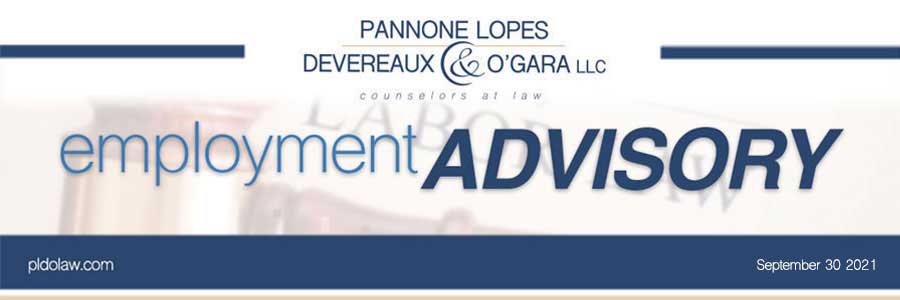PRESIDENT BIDEN ORDERS OHSA TO DEVELOP EMERGENCY REGULATION MANDATING PRIVATE EMPLOYERS WITH 100 OR MORE EMPLOYEES TO REQUIRE COVID-19 VACCINE
On September 9, 2021, the Biden Administration ordered the Department of Labor’s Occupational Safety and Health Administration (OSHA) to develop a rule that will require all employers with 100 or more employees to ensure their workforce is fully vaccinated or require any workers who remain unvaccinated to produce a negative test result on at least a weekly basis before coming to work. OSHA will issue an Emergency Temporary Standard to implement this requirement. The Biden Administration did not provide a timeline on when the regulation would be issued. It anticipates that this requirement will impact over 80 million workers in private sector businesses with 100 or more employees.
Employer Duties
Until OSHA issues its regulation, employers will not know the full extent of what will be required of them by the emergency regulation. At a minimum, it appears that employers with 100 or more employees will need to do the following: (1) issue a vaccine mandate, (2) ensure that employees obtain the COVID-19 vaccine by a deadline set by the OSHA emergency regulation, and (3) monitor unvaccinated employees by requiring that they obtain weekly COVID-19 tests.
Unanswered Questions
The Biden Administration left unclear whether employees may obtain exemption from the vaccine mandate for medical or religious reasons. For employers in the State of Rhode Island, the Rhode Island Department of Health (DOH) recently issued guidance requiring all health care workers obtain the COVID-19 vaccine. For health care workers, DOH limited the medical exemptions available from its COVID-19 vaccination mandate to employees with a history of certain heart conditions and allergic reactions to the COVID-19 vaccine or other vaccines. The DOH based its limited medical exemptions on guidance received from the Centers for Disease Control (CDC). The Biden Administration could similarly adopt the CDC’s findings and employ limited medical exemptions.
As to religious exemptions, the Biden Administration could also limit employees from obtaining an exemption from the mandate for religious reasons.
Lastly, we do not know whether the weekly testing requirement will allow for employees to refuse the mandate and choose testing, or whether the regulation will only offer the testing option to employees who obtain an exemption for religious or medical reasons.
What’s Next?
It remains unclear whether President Biden and OSHA can make such a forceful intervention into the private sector. The federal government clearly has the power to demand compliance for its workforce and federal contractors, which the administration has already done by executive order. As to private employers, it remains unsettled whether a President may issue an order directing a federal agency to require private employers to mandate vaccines in order to address a national public health crisis. This is an issue of first impression that the federal courts will look at and review. There are going to be legal challenges to the emergency regulation and the United States Supreme Court recently stuck down the Biden Administration’s attempt to extend the eviction moratorium by executive order. Ultimately, the United States Supreme Court will likely decide whether the emergency regulation is constitutional. Given this, employers have the following options:
1 . Use the “It’s not us; it’s them” approach and mandate COVID-19 vaccines. For employers who have been hesitant to enact a vaccine mandate, the Biden Administration has provided an opening. The employer may state that they are issuing a vaccine mandate to come into compliance with the anticipated regulation to be issued by OSHA requiring all employees obtain a COVID-19 vaccine. This allows employers to place blame on the government for the mandate while encouraging employees to obtain the vaccine.
2. The “wait and see” approach.
As stated above, there will be challenges to the regulation. Employers do not have a present obligation to act but could lose this opportunity to mandate a vaccine and be able to shift blame for the mandate.
3. Other Steps. Employers should prepare for a mandate, even if the proposed regulation is ultimately found unconstitutional. Steps include: (1) developing a vaccine mandate policy, (2) ensuring that employees have a clear understanding of how employees may request accommodations for religious or medical reasons, and (3) having human resources prepare for employees who will try to avoid a vaccine at all costs (FMLA, TDI, Workers Compensation, claimed stress and anxiety and religious discrimination).
By preparing now, employers can limit potential risk and also avoid any wrongful unemployment or discrimination claim. For example, an employer should have a vaccine policy in order to show an unemployment referee or human rights commission investigator that there was a clear process, the employer followed any OSHA guidance, the employer followed the process, and the employee refused vaccination.
PLDO employment attorneys are here to answer any questions you have about this proposed mandate or employer ordered vaccine mandates. Please contact PLDO Principal William E. O’Gara and Partner Matthew C. Reeber at 401-824-5100 or email wogara@pldolaw.com or mreeber@pldolaw.com.
[back to top]
|




